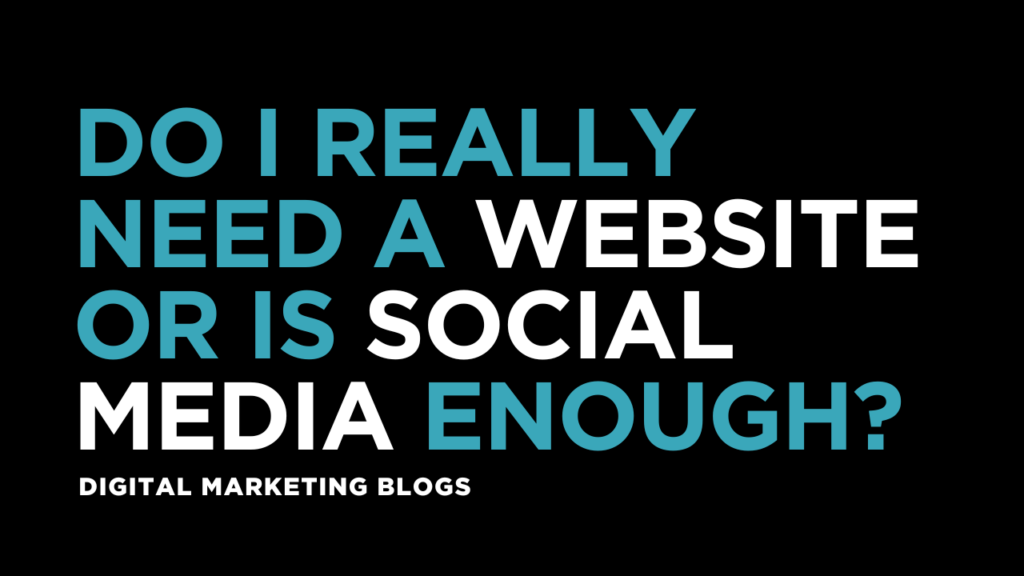Business owners and marketers often face a common question: is it necessary to build a website, or can social media alone handle all your digital needs? With millions of users actively engaging on platforms like Instagram, Facebook, and LinkedIn, social media seems like a complete solution. But is it truly enough?
This blog explores the advantages and limitations of relying solely on social platforms and helps you decide whether investing in a website is the right move for your brand.
Why Social Media Feels Like a Complete Solution
For many small businesses and freelancers, social media offers a quick, cost-effective way to go online.
1. Easy Setup, No Cost
Creating a profile or page takes minutes. There’s no need for coding, design, or upfront investment. You can start promoting your services or products almost instantly.
2. Built-in Audience
Social platforms already have massive user bases. Your potential customers are there—scrolling, searching, and sharing—so you can reach them without much effort.
3. Direct Communication
Engaging with followers is simple. You can answer queries, respond to feedback, and build relationships through comments and messages.
4. Content Virality
A well-crafted post or reel can go viral, bringing a flood of new followers and attention without any additional cost.
The Hidden Risks of Relying Only on Social Media
Despite its reach and convenience, social media has significant limitations that become clear as your business grows.
1. Lack of Ownership
Your content, followers, and data belong to the platform—not you. If an account is suspended or the algorithm changes, your visibility can vanish overnight.
2. Poor Search Engine Visibility
Social profiles rarely rank high in search results. Without a website, it’s harder for people to find you through Google or Bing, especially when they search for services in your niche.
3. Short Content Life
Posts have a short lifespan. After a few hours or days, even your best content disappears from users’ feeds, making it harder to build long-term visibility.
4. Trust and Credibility Issues
Many customers check for a website before making a purchase or booking a service. Without one, your brand may seem less professional or less trustworthy.
5. Limited Sales and Funnel Options
While social media is great for discovery, it’s not ideal for closing sales or nurturing leads through a conversion funnel. Websites offer tailored landing pages, forms, and checkout processes that improve results.
Why a Website Still Matters
Even with a strong social media presence, a website brings long-term value that no platform can match.
1. Full Control Over Branding
You decide how your site looks, what it says, and how users interact with it. No limitations on design, layout, or messaging.
2. Long-Term Content Value
Content published on your site can continue to generate traffic and leads for years through search engines. Blogs, case studies, and service pages are all assets that grow over time.
3. Advanced Analytics
Website tools like Google Analytics and heatmaps give you deep insights into visitor behavior, allowing for smarter marketing decisions.
4. Search Engine Optimization (SEO)
With the right content and structure, your website can rank for valuable keywords, bringing in consistent organic traffic without paid ads.
5. Future Scalability
From adding e-commerce features to launching a blog or member portal, your website can grow with your business needs.
When Social Media Alone Might Work
There are scenarios where a website may not be essential right away:
-
You’re testing a new business idea or product
-
The audience is highly engaged on a specific platform
-
You rely on direct messaging and real-time interactions
-
Budget constraints limit investment in web development
In these cases, social media provides a great starting point. But as your goals expand, a website becomes harder to ignore.
The Best Approach: Use Both Strategically
Rather than choosing between a website and social media, the smartest brands use both together. Here’s a quick comparison:
| Feature | Social Media | Website |
|---|---|---|
| Audience Reach | Immediate | Grows over time |
| Branding Control | Limited | Full |
| Data Ownership | No | Yes |
| Conversion Tools | Basic | Advanced |
| SEO Visibility | Low | High |
| Lifespan of Content | Short | Long |
| Scalability | Limited | Flexible |
Using social platforms to attract attention and a website to convert and retain users creates a strong digital foundation.
For Digital Marketers in Regional Markets
If you’re a growing brand or a digital marketer in Calicut, having a professional website helps position you as a credible expert. Clients searching for local services are more likely to trust a business that has its own domain, clear service pages, and well-written content tailored to their needs.
Social media might attract attention, but your website is where conversions happen.
Final Thoughts
Social media is a valuable tool for visibility, connection, and brand storytelling. But it isn’t built for long-term business control, customer data ownership, or scalable growth.
Building a website doesn’t mean abandoning social media—it means adding a foundation that supports your digital presence for the long haul. The combination of a strong website and active social media is what truly drives modern marketing success.



